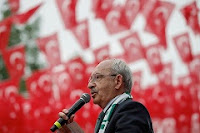As the United States stares down the barrel of a deadline to
raise the national debt ceiling, past and current Pentagon leaders are sounding
the alarm on how such an event could be deeply damaging to the country and
those who keep it safe.
Disrupted
pay for service members, late benefits checks for veterans and a hit to US
national security are only a glimpse into what could come.
Defense
Secretary Lloyd Austin made that much clear this week, telling
lawmakers that the Pentagon won’t, in some cases, be able to pay our troops
with any degree of predictability,” should a default come to pass.
Joint
Chiefs of Staff Chair Gen. Mark Milley said such an event could also embolden
China and increase risk to the United States.
The debt limit is the dollar figure up to which the Treasury
Department can borrow to pay for congressionally approved spending decided
through the annual appropriations process.
The
Biden administration and the GOP are at a standstill on the matter, with
congressional Republicans demanding cuts in exchange for lifting the ceiling.
The White House, however, has stood firm that the limit should be raised now,
and spending cut negotiations will be handled separately.
With the deadline approaching in a manner of week, the
brinkmanship between the White House and congressional leaders to avoid a
default so far has not made progress.
The Treasury Department has warned the country could
default, an unprecedented event in modern times, as soon as June 01, 2023.
And the Congressional Budget Office (CBO) issued a report
Friday that estimated the federal government’s deadline could now be the first
two weeks of June.
The
Treasury has never been incapable of paying US debt obligations – the one
exception being in the War of 1812 when parts of Washington were burned,
including the Treasury building – it’s not exactly clear what the effect would
be on government payments.
As the matter depends on how the Treasury Department decides
to prioritize US bills, it’s to be seen what takes precedence. Ongoing
obligations that deal with national security, however, require a big chunk of
that change.
The Defense Department expends multiple billions of
dollars every day for military, civilian and contractor pay; fuel to run bases
and keep ships at sea; maintaining US nuclear deterrents; keeping production
lines running; and Social Security, Medicare and retirement payments for
veterans.
It would not just be a huge stain on US credibility in
a very dangerous and unstable world; it would be the equivalent of a
government shutdown of our national security.
The government could use whatever revenues it
takes in if the debt ceiling is not raised, but those amounts would be woefully
insufficient to support normal operations.
On
military salaries alone, the US is due to pay out about US$4 billion on June
15, according to an analysis released earlier this week by the Bipartisan
Policy Center.
On June
01, another US$12 billion is supposed to go to military and civilian retirement
payments and US$12 billion towards veterans’ benefits.
This isn’t the first time past and current Pentagon
officials have raised alarms on how a default would affect the military.
In a letter released in October 2021, the last time
Washington neared the ceiling, Austin warned that a default would undermine
the economic strength on which our national security rests and that it would
also seriously harm our service members and their families.
“I would have no authority or ability to ensure that our
service members, civilians, or contractors would be paid in full or on time,”
he wrote at the time.
Austin noted that benefits for 2.4 million military retirees
and 400,000 survivors would be at risk, federal contractors could have their
payments delayed, and America’s international reputation and the stature of the
US dollar would be at risk.
Seven of Austin’s predecessors, in a separate letter to
Congress, said that should a default halt payments to members of the military,
it is unclear whether they would ever be repaid.
Congress eventually raised the debt limit to roughly US$31.4
trillion in late 2021, but not without months of drama.
Lawmakers are back in a similar situation this spring, as
the GOP-led House has held firm on not raising the debt ceiling without
significant spending cuts.
President Biden and Speaker Kevin McCarthy earlier this
week sat down with other congressional leaders to find a way forward, but no
major movements have happened.
For now, Pentagon leaders are making sure Congress
understands the consequences should a debt default come to pass.
“There’s just a number of things that we’re working with
allies and partners on that would come into question as to whether or not we’ll
be able to execute programs, but most important, this will affect the
livelihood of our of our troops and our civilians,” Austin told lawmakers on Thursday.






